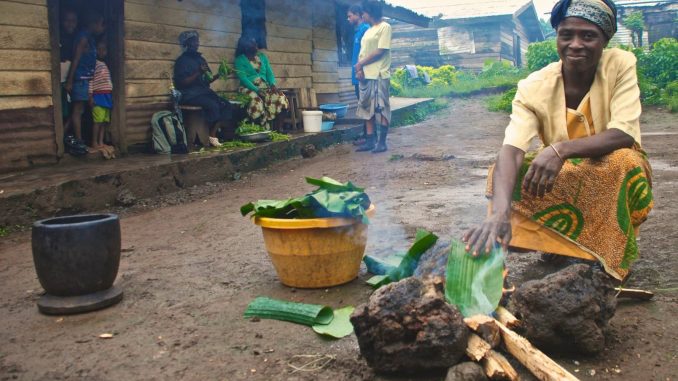
Ethnic Bakweri woman from Bakweri village of Wonganga in Buea in Cameroon, West Africa heating a plantian leaf before using it to wrap food. This technology is very common among all Africans and it is said that eating from leaves with bare fingers gives the best of taste.
The Bakweri (or Kwe) are ancient fierce fighters, traditionally spiritual, customs-abiding and agriculturalist Mokwe-speaking people of Bantu origins who live on the steep but fertile slopes of the Cameroon Mountain (Mt Fako) in the Republic of Cameroon. They are closely related to Cameroon’s coastal peoples (the Sawa), particularly the Duala and Isubu.
The Bakweri live primarily in over 100 villages east and southeast of Mount Cameroon with Buea as their main population centre. Bakweri settlements largely lie in the mountain’s foothills and continue up its slopes as high as 12,000 metres. They have further villages along the Mungo River and the creeks that feed into it. The town of Limbe is a mixture of Bakweri, Duala, and other ethnic groups.
The Bakweri who are aboriginal Bantu people originated from Mboko, the area southwest of Mount Cameroon and migrated to their present home east of the mountain in the mid-18th century. They also trace their ancestry to Mokuri or Mokule, a brother of the Duala’s forebear Ewale, who migrated to the Mount Cameroon area for hunting.
According to Edwin Ardener (in Nigeria No. 60, pp. 31-8, 1959) They are quiet and reserved and are not widely known outside the Southern Cameroons despite the fact that both the Premier of the Southern Cameroons, Dr. E. M. L. Endeley, and the capital, Buea, are The Bakweri are primarily concentrated in Cameroon’s Southwest Province.” Dr. E. M. L. Endeley was the first Prime Minister of the British Southern Cameroons from 1954–1959. He led other Southern Cameroonian parliamentarians to seccede from the Nigerian Eastern House of Assembly in 1954.
Historically the Bakweri are territorial people and fierce fighters who have always defended their rights, land and culture against the successive colonising powers of Germany and Britain.
It must be noted that the Bakweri people were one of the African people to resist the spoliation of their lands by German imperialists.
They are known to have mounted a fierce anti-German campaign led by their fearless leader, Chief Kuva Likenye of Buea, particularly around the slopes of Mount Fako, and successfully inflicted a humiliating defeat on the Germans at Buea in 1891; the first ever German military loss on the African continent, which led to a complete reappraisal of German colonial/military policy on the continent, and, unfortunately, laid the basis for the brutal campaign to annihilate the Bakweri. The Bakweri were one of the few groups in all of German Africa that were thoroughly and systematically suppressed by the Germans. That they even survived to tell the story is a testimony to their resilience and tenacity in the face of adversity.
The Bakweri are known in Cameroon for their traditional wrestling (Wesuwa), which encompasses all the qualities the Bakweri have inherited from their ancestors: physical endurance, agility, fierce fighting techniques, and a great sense of competition. Wesuwa is taken very seriously by all the members of the community and the most interesting thing is that women takes part in this wrestling contest long before . In the past wrestling used to be an important way of determining leadership in the villages; it even resulted in a war between two villages in 1891, when people from Ghango burnt down the village of Molonde in revenge for the death of their best wrestlers.
Before the beginning of colonial conquest in the early 1880s, the Bakweri constituted a very fragmentary society dominated by an egalitarian ideology– it is not even certain that there was ever a real chieftaincy position at the village level. Ardener however emphasizes that there was a strong tendency among the Bakweri to accumulate wealth, particularly, goats, pigs and short cows. It was through accumulation that individuals increased their prestige in the villages.
Although the Bakweri are now completely modernised, some have even converted to Christianity, they are still attached to their ancestral traditions and have retained their ancient tribal organisation. Each Bakweri village is headed by a chief and his tribal council who are central to all cultural events. The Bakweri take pride in celebrating their cultural heritage during events such as the Race of Hope, when they perform secret rituals to bless the mountain.
The symbol of the Bakweri people is the elephant or Njoku. To say that the Bakweri have a mascot, which happens to be the elephant, would be an understatement. Indeed, the reverse is true. For the Bakweri, the elephant, a denizen of the rain forests of the slopes of Mount Fako, is not just a mascot. It is a cultural symbol, a mystical, spiritual co-creature. To the Bakweri, the Balondo and the Bomboko, people can, and do become elephants, and elephants can and do become people. The attributes of the elephant or Njoku are part and parcel of the psyche of the Bakweri people. The creature’s sheer strength, size, loyalty to its (family) troupe, its calm, yet unpredictable temperament, proud indifference, and graceful demeanor are, to the Bakweri, the picture of physical and psychic behavioral perfection. It is therefore no surprise that the Bakweri, have a secret society that venerates, imitates and personifies the attributes of the elephant. Indeed, those who belong to the Maalé, the secret elephant society, swear by nothing other than Loxodonta Africana (the African elephant.)
The Bakweri`s Mount Fako (Cameroon) is a unique Ecotourism Site. This lovely volcanic mountain welcomes visitors immediately they arrive Buea. It stands majestically along the background of Buea Town. The Mountain spreads from Bomboko to Bakweri of Buea and down to the Limbe Beach. It is 4100 metres in height. A visit to Mount Cameroon is always an exciting experience both in the rainy and dry seasons.
BY: Kweku Darko Ankrah
